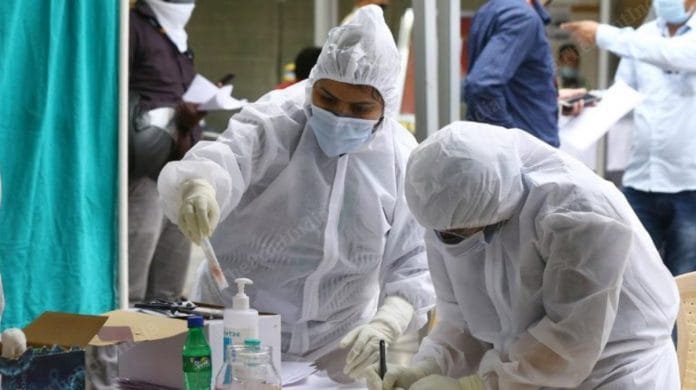New Delhi: A new study has found that “self-imposed prevention” measures such as handwashing and wearing masks, coupled with social distancing norms by the government, can help mitigate and delay a second surge of Covid-19.
Published in the PLOS Medicine — a peer-reviewed open access journal — Tuesday (21 July), the study aims to understand “the individual and combined effectiveness of self-imposed prevention measures and short-term government-imposed social distancing in mitigating, delaying, or preventing a Covid-19 epidemic”.
It has been authored by Alexandra Teslya, Thi Mui Pham, Noortje G. Godijk, Mirjam E. Kretzschmar, Martin C. J. Bootsma and Ganna Rozhnova from the Utrecht University in The Netherlands.
The study says that self-imposed measures such as handwashing, mask-wearing and social distancing, can “delay the epidemic peak”, flatten its curve and reduce attack rates.
Focussing on the rate at which disease awareness spreads and its impact on people, the study notes that a large epidemic can be prevented when efficacy of self-imposed prevention exceeds by 50 per cent.
It cites another study by US researchers on how ethnic minorities, with socioeconomic disadvantages, were more likely to get infected by the virus, to highlight the importance of self-imposed prevention measures.
The study notes that dissemination of information is highly crucial for the elderly, disadvantaged individuals, or those with lower levels of education.
Considering factors such as densely-populated areas, poor personal and environmental hygiene, as well as low healthcare affordability, it is essential to use all platforms — including social media, radio, television, newspapers, postal mails, and telemarketing to ensure that information reaches everyone.
Also read: Why you should not get depressed over studies that say Covid antibodies fade fast
Combination of prevention measures & social distancing
The study also states that it does not account for random errors in data that cannot be predicted, demographic profiles of participants including age and sex, uneven contact patterns among people, environments to which participants were exposed to, and the potential but unconfirmed phenomenon of reinfection with the virus after recovery.
Thus, its result must be looked at in qualitative measures.
Various countries have been reeling under the economic impact of lockdowns. India’s economy is set to “contract by -4.5 per cent in 2020“, the slowest growth since 1961.
Similarly, New South Wales had lost $1.2 billion in revenue in April alone. The UK’s economy shrank by 20.4 per cent during its April lockdown and the world economy is set to experience the worst recession since the Great Depression.
Through their study, Teslya and colleagues assert that self-imposed measures alone have “very limited impact on the economy but contribute very significantly to epidemic control”. However, when these measures are combined with government-imposed social distancing, they can be pivotal in defeating the pandemic.
Also read: Immunotherapy could be safe for cancer patients with Covid, early data indicates






